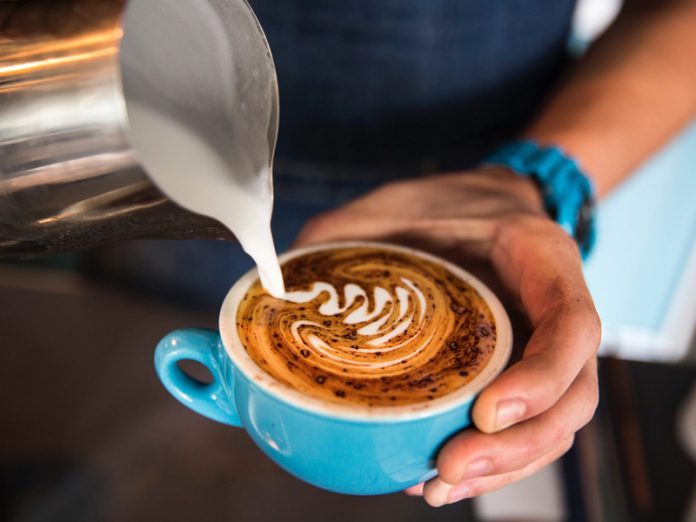CLAIRE FELICES ruminates on what that addictively robust dark bean means to us mere mortals …
“I bought a decaffeinated coffee table, you can’t even see a difference.” – Author unknown.
Dark and sensuously alluring, strong and full-bodied … such are the attributes normally associated with attraction and the ability to command attention.
Yet these passionate adjectives are equally at home when used to describe how we want our coffee.
No beverage has ever tickled the senses or the brain more than coffee. A single whiff can wake a person up … in a split second we can be eagerly anticipating the first sip of satisfaction hitting just the right spot.
That first liquid hit can be crucial – it can make or break the tone of the day.
Should it be exact to one’s taste, thoughts of the rest of the day stealthily creep in – the firing of ideas and energy – the metaphysical machinations of the mind.
Most of which become relegated to the back of one’s consciousness until the draining of that first cup – or the second or the third.
“No coffee can be good in the mouth that does not first send a sweet offering of odor to the nostrils.” – Henry Ward Beecher.
The History of Coffee
Coffee has had a long tumultuous history across the centuries. First made as wine used for Muslim religious rites and ceremonies, it spread slowly to other parts of the globe through barter. Since then it made its way to the streets and pubs of the modern-day world, down even to the humblest abodes, a refreshing offering for any weary head that enters the door. Yet as it flowed through monarchies and religious orders, coffee has also been banned many times – the reason being that people initially become idle – yet ultimately coffee then triggered subversive impulses and actions as a result of discussion and debates credited to the stimulating effects of caffeine consumption.
A PROCLAMATION FOR THE SUPPRESSION OF COFFEE HOUSES: “Whereas it is most apparent that the multitude of Coffee Houses of late years set up and kept within this Kingdom – and the great resort of idle and disaffected persons to them, have produced very evil and dangerous effects; as well for that many tradesmen and others, do herein misspend much of their time, which might and probably would be employed in and about their Lawful Calling and Affairs; but also for that in such houses … diverse, false, malicious, and scandalous reports are devised and spread abroad to the Defamation of His Majesty’s Government, and to the disturbance of the Peace and Quiet of the Realm; his Majesty hath though it fit and necessary that the said Coffee Houses be (for the Future) put down and suppressed …” – King Charles II of England, December 23, 1675, revoked on January 8th due to widespread citizen protest.
For centuries coffee has widely been regarded as a social beverage. Most coffee houses then and now offer the pleasures of meeting up with friends or associates in stress-free surroundings, over chess and backgammon with friendly banter, business dealings or merely just to hang out and catch up. Conversations overheard may be that of idle gossip to issues on policy and governance. Variations of acoustic music, plush ambience and a multitude of snack and hors d’oeuvres complete the settings … or it could be al fresco over park benches or rooftops, or from boardrooms to bedrooms. It’s shared over smiles and laughter or tears even over a fiery argument morning, noon and night and all the hours in between.
“It was a pleasant cafe, warm and clean and friendly, and I hung up my old water-proof on the coat rack to dry and put my worn and weathered felt hat on the rack above the bench and ordered a cafe au lait. The waiter brought it and I took out a notebook from the pocket of the coat and a pencil and started to write.” – Ernest Hemingway.
Acquaintances of promise are sealed or rejected over a cup of coffee; a chance to explore the possibilities of a personal and/or business relationship. Nothing is as non-threatening as getting together for a cup of coffee as long as you don’t elucidate how you like it made directly after the invitation. Once you’re in the cafe, though, the more specific and articulate you are about your preference, the more social status you acquire there on the spot. The editor of this website has made it his personal quest to make respectable his personal morning drug of a long black with honey. So far, only the Sydney suburbs of Glebe, Newtown and Alexandria have been receptive to his request. If he goes further out than that, the baristas feel assaulted by his idiosyncratic selection and they only assuage him on the rarest of occasions.
A Contemporary Secular Religion
To old friends, having coffee allows the space to revisit memories and rekindle fun times shared over the years. And yet there’s so much more to this social trend of sitting around funky little cafes with pretty little people absorbing groovy inoffensive little background tunes (cafe music – what a scintillating genre) …
For on Sunday mornings, instead of being bored stiff in churches, athiests and agnostics from Australia to Argentina prefer to engage in a non-commital form of confession.
In cafes everywhere, societal sinners can confess their “sins” of the week. A mild offence taken here, a raised eyebrow there. Coffee gets the mind going and the lips moving. Out comes the gossip and the soul is cleansed.
In pairs their mutual casual prayers invoke the Goddess Caffeina,cloaked in cappucchino foam she spreads a latte-light across the globe, healing friendships and guiding devotees to a caffeine-addicted nirvana where old mates can strip off their social baggage and dance naked in each other’s minds, if only between 10am and midday on a Sunday morn.
“After all, coffee is bitter, a flavor from the forbidden and dangerous realm.” – Diane Ackerman.
As coffee can establish new relationships, it has also been known to sever others. In olden days Turkish laws allowed a woman to divorce her spouse should he fail to keep the coffee pot filled or in essence giving the wife her quota of coffee.
“It’s the non-relationship drink of choice. It’s not a date, it’s a caffeinated beverage. Okay, sure, it’s hot and bitter like a relationship that way, but … like …” – Buffy the Vampire Slayer/ Allison Hannigan as Willow.
To Drink, or not to Drink?
There’s been talk though of coffee being bad for the health. Whether its reputation is deserved or not is still very much debatable. Most coffee drinkers would swear they don’t even feel human until they’ve finished their third cup.
Coffee has been known to prevent drowsiness and depression – and can act as a temporary muscle relaxant and give provisional relief from arthritic pain. It cleans the system as it contains soluble fibres and acts as a mild laxative. Some studies show it is beneficial in slowing down certain types of cancer such as skin and breast cancer. It’s a well known fact that coffee contains antioxidants that are good for the body, some say even the mist emanating from a hot cup has these antioxidants “the equivalent of which are found in oranges”.
“Caffeine isn’t a drug, it’s a vitamin” – Author Unknown.
Long term consumption of coffee slows down dementia with more apparent long-term better memory manifested more on women than men. Although there is a tendency to lose certain bone minerals through the diuretic process that coffee drinking is known to amplify.
“Now you’ll find out why Ms Sherwood shows up for breakfast, Tom. It’s not love, it’s my coffee machine.” – The Talented Mr Ripley – Dickie.
Claims have been made that mild to moderate caffeine consumption can increase sensual receptiveness and is more conspicuous on women than on men. It might be a good idea to trade that wine glass and beer bottle for a deliciously sultry coffee mug then, lads – at least on the morning after the night before.
“I think if I were a woman I’d wear coffee as perfume.” – John Van Druten.
Aside from having a very distinguishing and recognisable scent that one can almost taste, the lingering memory of how that hot liquid slowly goes down and spreads its ardor … enveloping the body with its fierce heat … is enough to make one find a more comfortable position to enjoy the most of its intensity. It’s like liquid Prozac only more accessible and works a trifle faster.
“Without my morning coffee I’m just like a dried up piece of roast goat. – Johann Sebastian Bach.
As with anything else, excessive intake of coffee can prove harmful if not fatal. Yet would take very conspicuous amounts for coffee to be unfavorable. After the body has had its quota of caffeine, it will just secrete out the extra caffeine you’ve taken in. Voltaire was reputed to have been consuming 50 or more cups of coffee a day. He certainly loved that swirling mist from his bitter and fiery cup of love.
“Actually, this seems to be the basic need of the human heart in nearly every great crisis – a good hot cup of coffee.” – Alexander King.
Coffee Stimulates Pure Genius
After all’s said and done, most memories we have of a person enjoying his coffee is someone relaxed and dreaming big dreams or might be that one person having a leisurely time sipping the brew looking out the window to check everything is alright with the world. Or even better, a genius at work.
“The powers of a man’s mind are directly proportioned to the quantity of coffee he drinks.” – Sir James Mackintosh.
One wouldn’t at all mind being thought of as a genius, would one? Now, where’s my mug?



